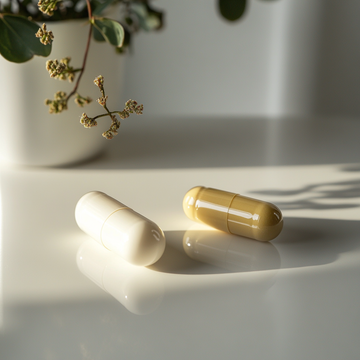What are electrolytes and why are they so important?
Electrolytes play a crucial role in your body, especially if you exercise regularly or are physically active. Although electrolytes are often mentioned in connection with sports drinks, many people are unaware of the vital functions these minerals actually perform and why they are so crucial, especially for athletes. But what exactly does this term mean, and why should you pay attention to an adequate electrolyte supply? Here's everything you need to know.
Electrolytes simply explained
Electrolytes are charged minerals dissolved in body fluids such as blood, sweat, and urine. They carry electrical charges and thus enable the transmission of electrical impulses between cells. The most important electrolytes for the human body are:
-
sodium
-
potassium
-
magnesium
-
Calcium
-
chloride
The individual electrolytes in detail
sodium
Sodium significantly regulates your body's water balance and influences blood pressure. It is crucial for muscle contractions and the functioning of the nervous system. A sodium deficiency often manifests itself in muscle cramps, dizziness, or general weakness.
potassium
Potassium works closely with sodium to ensure optimal muscle and nerve function. It also supports heart function and regulates fluid balance in your cells. A potassium deficiency can lead to fatigue, muscle weakness, and, in the worst case, cardiac arrhythmia.
magnesium
Magnesium is essential for energy production and muscle relaxation after physical exertion. It reduces muscle cramps, promotes recovery, and plays a key role in metabolism. It also effectively prevents muscle soreness. Typical signs of a magnesium deficiency are cramps, fatigue, and exhaustion after exercise. When choosing magnesium, always pay attention to the different forms of magnesium. Not all of them have the desired effect.
Calcium
Calcium is not only crucial for strong bones, but also important for muscle contraction and nerve transmission. A balanced calcium level contributes to better performance and supports recovery. Calcium deficiency can lead to osteoporosis in the long term and muscle cramps in the short term.
chloride
Chloride works with sodium to regulate the body's fluid balance and contributes to the production of stomach acid. Although chloride deficiency is rare, it can lead to digestive problems and acid-base imbalance.
Why do athletes lose electrolytes?
During intense physical activity, your body sweats to cool itself. With this sweat, you lose not only fluids but also significant amounts of electrolytes, especially sodium, potassium, and magnesium. If these losses are not compensated, your performance will be impaired and your recovery time after exercise will be prolonged. Severe deficiencies can also lead to muscle cramps. This makes it all the more important to ensure you have sufficient electrolytes during exercise.
How do you recognize an electrolyte deficiency?
An electrolyte deficiency can have serious consequences for your health and performance. The most common signs are:
Muscle cramps or muscle twitches
Headache or dizziness
Tiredness and exhaustion
Loss of performance in sports
Difficulty in regeneration after exertion
Cardiac arrhythmias, especially in cases of potassium deficiency (rare)
Mental confusion or concentration problems with severe sodium deficiency (rare)
Long-term consequences of untreated electrolyte deficiency can include serious health problems such as chronic fatigue, frequent muscle injuries, heart problems, or a general weakening of the immune system. This makes it all the more important to always ensure you're properly replenishing these minerals during physical exertion.
How do you optimally supply your body with electrolytes?
To effectively compensate for electrolyte losses, you can use specially developed sports drinks or nutritional supplements. These products provide the right mix of electrolytes your body needs after intense exercise and support faster and more effective recovery. Here's our recommendation: MTM Amino Electrolyte, to cover everything with just one product.
You should also ensure you eat a balanced diet rich in mineral-rich foods such as bananas (potassium), spinach (magnesium) and salty foods (sodium, chloride).
Conclusion
Electrolytes are essential for anyone who regularly exercises or is physically active. Adequate intake contributes significantly to improving your performance and recovery. Therefore, pay careful attention to your electrolyte intake to achieve optimal athletic results and stay healthy and productive in the long term.
Sources:
-
Institute of Medicine (US) Panel on Micronutrients. (2005).
Dietary Reference Intakes for Water, Potassium, Sodium, Chloride, and Sulfate.
National Academies Press. https://doi.org/10.17226/10925 -
Maughan, R. J., & Shirreffs, S. M. (2008).
Development of individual hydration strategies for athletes.
International Journal of Sport Nutrition and Exercise Metabolism, 18 (5), 457-472. https://doi.org/10.1123/ijsnem.18.5.457 -
Sawka, M. N., & Montain, S. J. (2000).
Fluid and electrolyte supplementation for exercise heat stress.
American Journal of Clinical Nutrition, 72 (2 Suppl), 564S-572S. https://doi.org/10.1093/ajcn/72.2.564S




